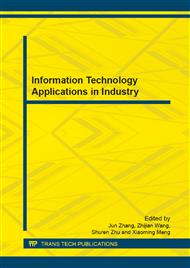[1]
G. Z and C. Lei, Study on e-commerce recommendation based on content analysis, in E-Business and E-Government (ICEE), 2011 International Conference on, may 2011, p.1–4.
Google Scholar
[2]
B. Sarwar, G. Karypis, J. Konstan and J. Reidl, Item-based collaborative filtering recommendation algorithms, in Proceedings of the 10th international conference on World Wide Web, ser. WWW '01, 2001, p.285–295.
DOI: 10.1145/371920.372071
Google Scholar
[3]
S. Zhang, W. Wang, J. Ford, F. Makedon and J. Pearlman, Using singular value decomposition approximation for collaborative filtering, in E-Commerce Technology, 2005. CEC 2005. Seventh IEEE International Conference on, july 2005, p.257–264.
DOI: 10.1109/icect.2005.102
Google Scholar
[4]
J. Mai, Y. Fan and Y. Shen, A neural networks-based clustering collaborative filtering algorithm in e-commerce recommendation system, in Web Information Systems and Mining, 2009. WISM 2009. International Conference on, nov. 2009, p.616–619.
DOI: 10.1109/wism.2009.129
Google Scholar
[5]
Z. He, The study of personalized recommendation based on web data mining, in Communication Software and Networks (ICCSN), 2011 IEEE 3rd International Conference on, may 2011, p.386 –390.
DOI: 10.1109/iccsn.2011.6014747
Google Scholar
[6]
G. Dou, Y. Zhu and Y. Han, Research on selection system based on bayesian recommendation model, in Advanced Mechatronic Systems (ICAMechS), 2011 International Conference on, aug. 2011, p.35–38.
Google Scholar
[7]
M. Zanin, P. Cano, J. M. Buld´u and O. Celma, Complex networks in recommendation systems, in Proceedings of the 2nd WSEAS International Conference on Computer Engineering and Applications, ser. CEA'08. Stevens Point, Wisconsin, USA: World Scientific and Engineering Academy and Society (WSEAS), 2008, p.120–124.
Google Scholar
[8]
Y. Zhang, M. Blattner and Y. Yu, Heat conduction process on community networks as a recommendation model, Phys. Rev. Lett., vol. 99, p.154301, Oct 2007.
DOI: 10.1103/physrevlett.99.169902
Google Scholar
[9]
T. Zhou, J. Ren, M. Medo and Y. Zhang, Bipartite network projection and personal recommendation, Phys. Rev. E, vol. 76, Oct 2007.
DOI: 10.1103/physreve.76.046115
Google Scholar
[10]
Y. Zhang, M. Medo, J. Ren, T. Zhou, T. Li and F. Yang, Recommendation model based on opinion diffusion, EPL, vol. 80, no. 6, p.68003, 2007.
DOI: 10.1209/0295-5075/80/68003
Google Scholar
[11]
J. Liu, M. Shang and D. Chen, Personal recommendation based on weighted bipartite networks, in Proceedings of the 6th international conference on fuzzy systems and knowledge discovery - Volume 5, ser. FSKD'09, 2009, p.134–137.
DOI: 10.1109/fskd.2009.469
Google Scholar


